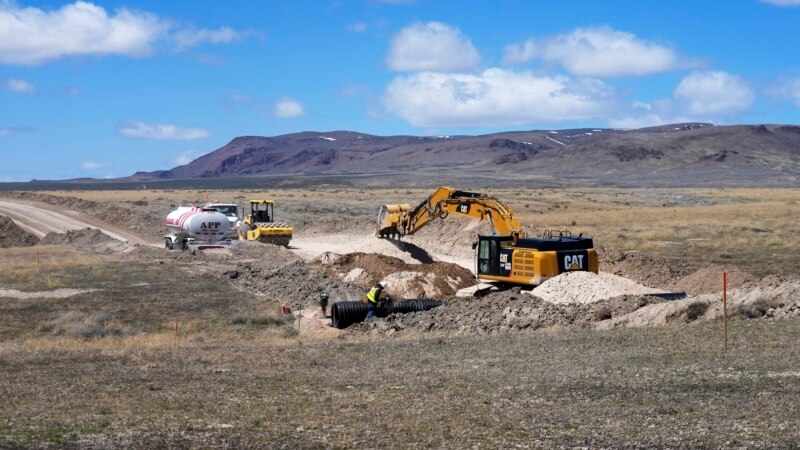
Earlier this month, the U.S. Department of Energy announced a record $2.26 billion in conditional loans to develop North America’s largest known lithium reserves. The loan is an important step in the U.S. government’s efforts to reduce its reliance on China for battery manufacturing metals.
Yet analysts say it may be too late to completely wean ourselves off China for metal processing and battery production.
The U.S. Department of Energy’s Loan Program Office (LPO) said the funds, if reviewed and approved, will help Lithium Americas Corp. build a lithium carbonate processing plant at its Thacker Pass mine project in Humboldt County, Nevada.
The LPO said the project would help “ensure reliable, sustainable domestic supply chains for critical materials, which is key to meeting our ambitious clean energy and climate goals and reducing our dependence on economic competitors such as China.”
Lithium Americas Corp. said on its official website that battery materials can be “sourced and manufactured entirely in the United States, reducing overall carbon footprint, transportation costs and supply chain risks.”
The LPO said Thacker Pass’s lithium carbonate could eventually support “battery production for up to 800,000 electric vehicles (EVs) per year, saving 317 million gallons of gasoline per year.”
Despite the U.S.’s pioneering and groundbreaking contributions to the development of lithium-ion batteries, industry experts say that currently lithium processing and electric vehicle battery production are still dominated by China.
On March 2, U.S. Treasury Secretary Janet Yellen said in prepared remarks when visiting a U.S. lithium processing plant in Chile: “Some of our critical supply chains, including clean energy supply chains, There is currently too much concentration in China.” The plant holds the world’s largest lithium reserves. Metal.
“This makes the United States more vulnerable to shocks from China or any country that dominates production, from natural disasters to macroeconomic forces to deliberate actions such as economic coercion.”
An Organization for Economic Co-operation and Development report last year said China’s export restrictions on critical minerals increased ninefold between 2009 and 2020.
Data from the U.S. Geological Survey shows that the output and scale of lithium mines in Australia and Argentina far exceed that of China. In 2022, Australia’s lithium mine production will be more than three times that of China.
There are still problems with refining and processing
But industry experts say that while Western countries have invested heavily in developing raw ore, they have paid little attention to refining and processing, where China dominates.
Ellen R. Wald, nonresident senior fellow at the Atlantic Council’s Global Energy Center, told VOA: “Lithium is not as useful as it is today. You have to refine it to make batteries. The materials used. And that’s where China controls the lithium battery supply chain, because almost all of the process of refining lithium into something that can be used to make batteries is done in China. “
According to statistics from Chatham House, Chinese companies will account for approximately 72% of global lithium refining capacity in 2022.
China also dominates much of the global market for battery-related equipment, leaving limited options for U.S. companies that want to demonstrate their domestic production credentials.
American Battery Factory, Inc. (ABF) is an emerging battery manufacturer that describes itself as “the first fully U.S.-owned vertical manufacturing, supply chain and R&D network for lithium iron phosphate batteries.”
But to ensure its first large-scale rechargeable battery factory in Tucson, Arizona, uses custom automation equipment and machinery, the company formed a partnership with Chinese company Ahead Intelligent Equipment.
Dependent on China
Wald said in a January article that China is fully capable of restricting access to lithium-ion batteries to certain countries or companies if it wishes, and that if the U.S. military suddenly finds itself in need of more specialized batteries, the Pentagon may not be able to obtain them. .
In February 2022, China announced sanctions on Lockheed Martin, the manufacturer of the F-35 fighter jet, and Raytheon Technologies, the world’s largest missile manufacturer. Although China did not specify the details of the sanctions, it is widely believed to be a threat to cut off the supply of critical minerals to Western countries.
“The U.S. defense industry basically relies on China for the specialized batteries they need for all their drones, surveillance systems, and various products,” Wald told VOA.
David Whittle, an adjunct professor of resource engineering in the Department of Civil Engineering at Australia’s Monash University, told VOA that even though “the world has developed a strong, independent lithium supply chain, until now the production of battery chemicals, China will remain the largest customer of these chemicals because it is the largest battery manufacturer, the largest battery pack manufacturer, the largest EV manufacturer and the largest EV market.”
The Thacker Pass lithium mine, located at the southern end of McDermit Crater, is considered one of the largest lithium mines in the world.
The record loan to Lithium Americas Corp. is the largest such loan for lithium project development as the United States in recent years steps up efforts to build domestic supply chains for critical minerals.
Wald said the Thacker Pass lithium project is not expected to begin production until 2028, and even then the goal may be too ambitious. The mine plans to extract lithium from the clay, but Wald said it has never been mined in this way on a commercial scale. Additionally, the mine’s remote and sparsely populated location requires the company to build housing for workers and their families and reassess its environmental impact.
Despite challenges, Wald says creating secure supply chains is not impossible for U.S.
“I don’t think it’s too late,” Wald said. “Can they compete with China on a global scale? Probably not. But can we create non-Chinese sustainable and secure supply chains? Yes, we can do that.”
Whittle said that Western countries’ “resilience to China’s challenge” no longer meant being “isolated from China”, but that resilience was still possible.
The DOE’s LPO said that while their announcement showed an intention to provide the loan, the company must first meet certain technical, legal, environmental and financial conditions before the funds can be released.
Adrianna Zhang contributed to this report.
Follow us on Google news ,Twitter , and Join Whatsapp Group of thelocalreport.in
















